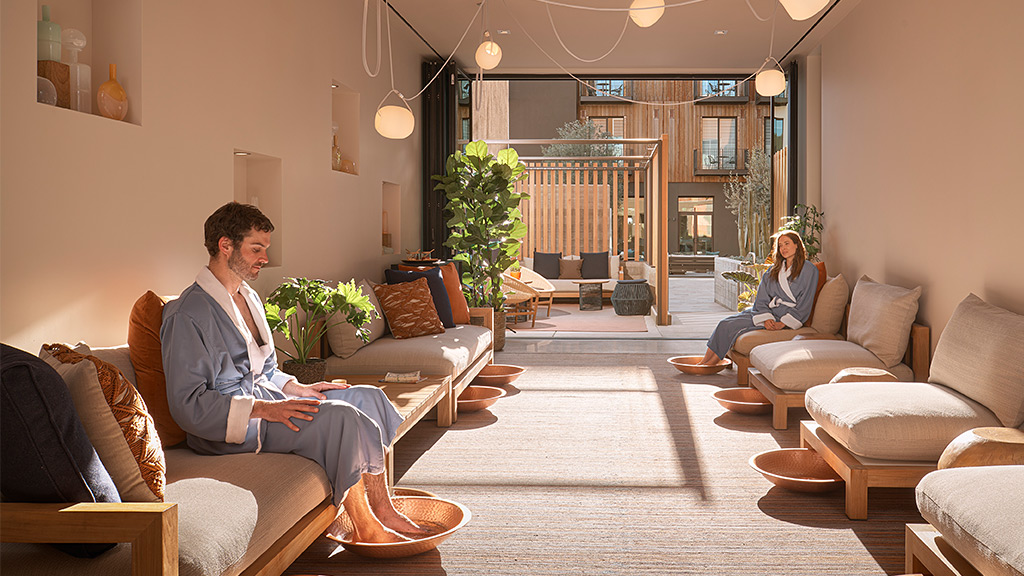The Sustainable Hotel: Designing for Wellness and Resilience
September 30, 2020 | By Angela Spathonis, Diane Thorsen, Julijana Mitic
Editor’s Note: This post is part of our ongoing exploration of how design is responding to the COVID-19 pandemic.
Many months after the start of the coronavirus pandemic, people have become hyper-aware of global health issues. We now have a keen interest in caring for ourselves in ways that we might have taken for granted in the past. This renewed sense of wellness extends to the buildings and spaces we spend time in, many of which are undergoing changes themselves.
For architects and designers working in the hospitality industry, we’re asking how this might affect our clients. What role design can play in positively reshaping hotels? How can design promote the health and wellbeing of guests? Can we identify new approaches to the wellness and sustainability of place?
Here are a few trends to consider as we reimagine the hospitality industry through the lens of global wellness:
There will be a continued focus on personal wellness.Before the pandemic, the wellness market was booming with a value estimated at $4.5 trillion. That industry is only expected to thrive as guests search for ways to take care of themselves. In response, hotels worldwide have been exploring new ways to meet wellness standards by incorporating wellness-focused changes at both the macro and micro levels.
Local farm-fresh food will be in big demand.The health crisis has done away with the hotel buffet, so many places are creating new food-focused experiences. One trend that emphasizes health and wellness is the farm-to-table hotel. These places offer a deeper connection to local cuisine and to the surrounding environment.
Some of these places grow and harvest food on-site, while others look for opportunities to connect and support local farmers. Besides providing farm-fresh healthy ingredients, farm-to-table hotels celebrate hyperlocal resources by offering culinary classes or gardening workshops. In many cases, local food trends have made many hotel menus healthier. Superfoods, plant-based alternatives, and gluten-free options have become standard.
"The industry has gone mad for sleep."
Our internal, light-timed circadian rhythms control almost every system in our bodies: from our sleep/wake cycles to our immune and metabolic systems.
At Gensler we are tailoring guestroom lighting to prevent insomnia and to simulate circadian rhythms. Soft, warm lighting minimizes disruption to circadian rhythms so guests can get a consistent night's sleep. These lighting systems also feature a colored temperature monitor that changes from subtle red lighting at night — so as not to suppress melatonin levels — to lighter, brighter simulators at dawn that wake guests naturally in the morning.
Jet lag is another wellness factor traveling guests encounter, which apps such as Timeshifter are addressing by guiding guests on when to avoid bright light, go to sleep, or stay awake to adjust to a new time zone.
Hotels can also promote a healthy sleep sensory experience by providing natural cottons for bedding. Natural bedding offers a calming, crisp white look and feel so guests can rest easy and maintain their health.
Finally, some hotels are introducing sound experiences, which can promote a calming and meditative atmosphere and signal that it’s time to relax or go to sleep. Wellness resorts even offer sound baths and sound healing, including Ayurvedic sound therapy massage and CBD sound journeys.
To avoid making direct contact with shared equipment in the hotel gym, many hotels are providing in-room smart gyms and personal training devices. Stationary bikes, treadmills, stretch balls, or yoga mats can be sent to guest rooms upon request. In-room technology also allows guests to personalize a meditation or workout classes.
The travel industry will continue to promote sustainability.In a world where there’s an increased focus on the impact we have on our planet, the travel industry is consciously working towards green initiatives that enhance environmental wellness. The global health crisis has increased awareness around our role in creating a sustainable future and shed a light on the direct connection between climate change and public health. As people changed their everyday behaviors and patterns to avoid the virus during lockdown, we saw a significant reduction in greenhouse gasses, and other air, water, and land-polluting outputs. This is an opportunity to realize we can have a positive impact on our environment by changing our behaviors and attitudes towards all-encompassing global wellness and developing innovative approaches.
Slow travel is a buzzword used for sustainable tourism where guests connect with nature and engage in activities like walking, cycling, and hiking in beautiful environments. Hotels will focus more on biophilic design and offering more outdoor spaces so guests can enjoy healthy activities in distanced spaces like rooftop yoga with a view, for example. This lets guests be more tuned into their surroundings and senses through a green-friendly hospitality experience.
Healthy spaces also include access to effective air purification systems to filter air and operable windows to provide fresh air. Hotels are applying water-saving devices and considering vitamin C-infused showers and providing aromatherapy natural oils as a way to create a connection to nature and a sense of wellbeing. Hotels can also help save energy by installing occupancy sensors for lighting control and electronic devices that turn off when not in use and limit the use of heating and cooling systems.
As we resume travel, the sense of blurred life-work boundaries that we developed while working from home during the pandemic will likely extend and play a part in our hospitality stays. Millennials accustomed to a “work from anywhere,” blurred, digital lifestyle, are more apt to deploy a business-mixed-with-leisure mindset (i.e. “bleisure”) to their next hotel stay. Hotels can support popular bleisure activities including sightseeing, dining, and cultural experiences, and position themselves as local experts and allies of local businesses by offering add-on services and adventures.
The work-from-anywhere trend will define hotel accommodations.Hotels will become an extension of our work from home experience as travel resumes. During the pandemic, people have avoided taking vacations and there are also more independent workers who aren’t allotted formal vacation time. This creates a climate where people have emerged from lockdown and desperately need a vacation and new setting, but they also need to keep working. This gives rise to a new travel concept called, “the wellness sabbatical,” in which work and wellness are thoughtfully blended throughout the day. These stays could take place at destinations that actively and creatively offer a wellness-driven experience — think resorts that offer immersion in nature in low-sprawling spaces that are connected to the outdoors but also provide quiet environments for focused work.
As designers, we can partner with our hospitality clients to evolve the hotel into a sustainable and wellness-focused environment that’s ideal for relaxing, adventuring, or working away from home. The sustainable and healthy hotel of the future will focus on its staff’s wellbeing, actively involve guests and respond to their evolving habits and needs, and personalize the overall guest experience with a renewed commitment to wellness, sustainability, and the local community to create a rewarding and reimagined hotel stay.
For media inquiries, email .



